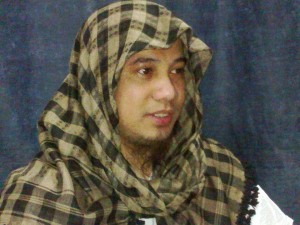I never lost hope, says freed OFW
MANILA, Philippines—In an old green plastic bag, pardoned Filipino death convict Rodelio “Dondon” Lanuza carried one book that kept his hopes up that freedom would eventually come.
“This is the hadith. It contains the sayings of Prophet Mohammad. It taught me that nothing is impossible,” Lanuza told reporters shortly after he arrived in Manila at 3:05 p.m. on Thursday.
It was a homecoming he looked forward to for 13 years.
“Imagine, I was a simple man who asked for help. Who would have thought that princes and kings would help?” Lanuza said.
Lanuza, now 38, arrived at the Ninoy Aquino International Airport Terminal 1 via Etihad Airways flight EY-424.
“I haven’t slept in two days … I am both excited and worried because it’s going to be a new world again,” said Lanuza, who was 25 when he was jailed for the killing of Saudi national Mohammad bin Said Al-Qathani in 2000.
Upon seeing his parents at the airport lounge, a sobbing Lanuza gave them a tight hug.
“It’s a miracle,” Letty Lanuza, his mother, told the Inquirer. “From the forgiveness, to the release, to the deportation, his arrival. It’s a miracle.”
“Now I can believe that he’s here. I’m beside him now,” said Lanuza’s father, Edilberto, who last saw him 16 years ago. The father was living in the United States even before Dondon left for Saudi Arabia in 1996, at age 22.
The overseas worker was pardoned upon payment of P32 million (3 million in Saudi riyals) in blood money, P25 million (2.3 million Saudi riyals) of which was shouldered by Saudi King Abdullah bin Abdul Aziz.
Lanuza was released upon securing a tanazul, or affidavit of forgiveness, from Al-Qathani’s family when he had completed the blood money payments.
“I felt confident that [I will not be put to death] because I know I am not guilty. My conscience is clean,” Lanuza told reporters in Filipino.
Lanuza, hired as an architectural draftsman in Saudi Arabia, said he acted in self-defense when he killed Al-Qathani who attempted to rape him.
“I also got stabbed many times,” said Lanuza, showing now healed stab wounds on his neck, his abdomen and legs.
Lanuza spent the first two years of his incarceration in solitary confinement per Saudi jail provisions for murder convicts. During those years, Lanuza said he had moments when “I was in despair, I got angry with God and thought of killing myself.”
While in confinement, Lanuza, a Christian, turned to Islam. He learned all about the faith for 10 months before converting in 2001.
Lanuza somehow got to sneak in a mobile phone in to his cell, a tool that he wisely used to fight for freedom.
“I talked to anyone, just anyone who could possibly help me. I didn’t care who I was talking to,” said Lanuza.
He thanked President Aquino, Vice President Jejomar Binay, the Department of Foreign Affairs and the Overseas Workers’ Welfare Administration for working for his pardon and repatriation.
Lanuza, still single, is set to meet his long-time girlfriend Friday. His family also requested privacy as they intended to spend time together to catch up.
Lanuza returned to his home in Barangay 398, Sampaloc, Manila, at around 5 p.m. Thursday, with residents flocking around the van and following him as he was helped home by barangay (village) watchmen.
The family is preparing a thanksgiving Mass Saturday.
Garry Martinez, chairman of Migrante International, said his group was confident that as a free man, Lanuza would continue to take up the cudgels for distressed OFWs.
“We are very happy for Dondon and the Lanuza family. All our efforts have not been in vain, and we attribute this mainly to Dondon’s fighting spirit and the collective efforts of friends, supporters and family,” said Martinez.
“There is still much help needed to campaign for the lives of other OFWs on death row. Dondon’s experience and story will serve as an inspiration to our kababayan who have been losing hope,” Martinez said in a statement.—With a report from Tina G. Santos
RELATED STORY:
